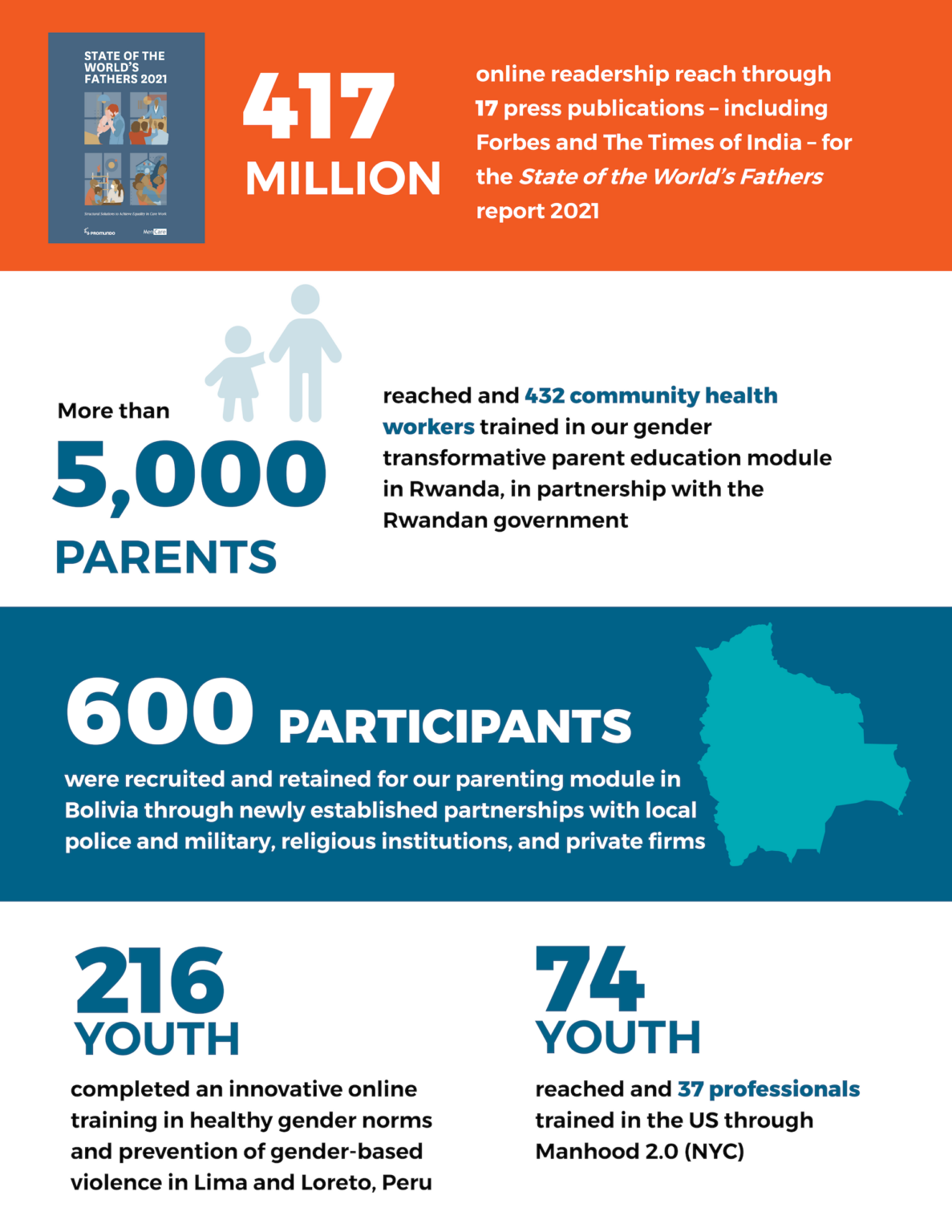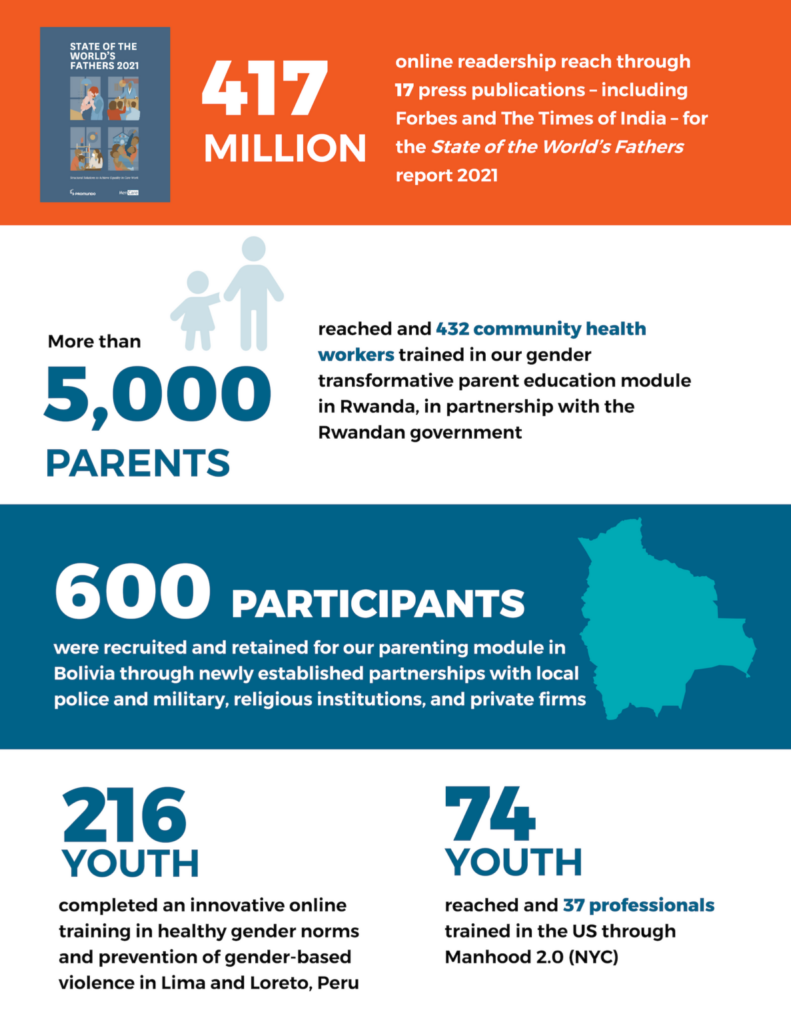Message from the CEO, Gary Barker
Dear colleague,
As we look back on 2021, and into 2022, we are mindful of the year’s challenges – worsened gender inequality in the face of COVID, increased violence by men against women in many countries, the crises of loneliness and unmet mental health needs, and political polarization. We are also proud to have partnered with activists, young people, researchers, NGO allies, governments, socially conscious corporations, and UN agencies to achieve transformative change – engaging men and boys as true allies in equality and social justice. In this annual report, we share our major achievements and spotlight the work of our amazing staff who – despite living through a global pandemic – helped move the needle on gender equality.
I encourage you to keep in touch with us: follow us on Twitter and join our community on Facebook to be the first to receive our latest insights.
As we continue our work in 2022, we invite you to consider partnering with us by making a contribution. Together, we can continue to promote and achieve healthy masculinities and gender equality.
In this annual report, we share strides we made toward:
PROMOTING MEN’S EQUITABLE CAREGIVING
- The State of the World’s Fathers 2021 report was released in June at the Generation Equality Forum, in partnership with the UN Foundation and Proctor and Gamble, and in the midst of ongoing COVID-related social and health challenges worldwide. The 2021 edition focused on structural barriers to equality in care work and their potential solutions. Specifically we focused on the outsized role that governments, employers, economies, and public institutions play in shaping family lives around the world. The seven ‘actions’ around which the report is organized – including creating National Care Plans and going upstream to change social norms from boyhood onward – will serve and inform Equimundo and MenCare advocacy for years to come. Read the executive summary or full report here.
- Taking effective parent training to scale with the government of Rwanda – With support from Wellspring, Saving Brains, the UK government, and the Oak Foundation, Equimundo and our partner RWAMREC began to test the scale-up of Program P (Equimundo’s flagship approach to target fathers) within the health system in Rwanda together with the Ministry of Health and Rwanda Biomedical Center. We are testing the delivery of the 17-session intervention for men and couples via the health sector in one district to generate data on the feasibility, quality, and fidelity of taking the approach at scale. To date, 432 community health workers (CHW) in Musanze district have been trained to implement the program with parents in their communities – more than 5,000 parents have been reached since last year. More than 30 district authorities have also been trained to support the implementation, monitoring and supervision of the approach and more than 700 local leaders have been engaged in supporting recruitment. This initial scale up is providing insights for making the program truly nationally available – a first anywhere in the world.
- Regional Training on Gender-transformative Parenting (Program P) in West Africa – We continue to provide technical assistance to UN Population Fund (UNFPA) West and Central Africa Regional Office (WCARO) in the context of the Sahel Women’s Empowerment and Demographic Dividend (SWEDD) program. As part of this process, we are working directly with nine UNFPA country offices in order to introduce a gender-transformative lens in the “Husbands Schools” run by UNFPA and civil society partners in the region, including the development not only of new methodologies but also of guidelines and tools to ensure harmonization of implementation as it relates to quality and fidelity across highly different settings.
PROMOTING MEN’S SELF CARE AS A PATHWAY TO CARE FOR OTHERS
- In March 2021, Equimundo and Dove Men+Care carried out a nationally-representative survey in the United States focused on the links between men’s care for themselves (physical, emotional and mental, and social) and their care for the people in their lives. Importantly, this research showed that men embracing care has a ripple effect that impacts everyone for the better. Men who make self-care part of their regular routine spend more than three hours a day caring for others and are twice as likely to help with household work. We launched the report, Care Leads to Care, on World Mental Health Day and it was featured in a TODAY op-ed by Glen Henry.
SPOTLIGHT ON RESEARCH: The Care, Coping and Connection under COVID-19 report presents findings from a phone survey with 500 couples in Rwanda, examining the impact of the pandemic on stress, caregiving, and family relationships. The study builds on a randomized controlled trial of the Bandebereho intervention to examine the longer-term (five-year) impact of the intervention on participating families. The data find that while the pandemic has been hard on many families, Bandebereho participants have tended to fare better than those in the control group, suggesting long-lasting impacts of the intervention on key outcomes related to men’s engagement in care work and on couple and family relations.
PROMOTING HEALTHY MASCULINITY FROM BOYHOOD ONWARD
- Calling out harmful masculinities online – Together with the Geena Davis Institute on Gender in Media and the Oak Foundation, we launched The Double-Edged Sword of Online Gaming: An Analysis of Masculinity in Video Games and the Gaming Community, a groundbreaking study examining masculinity and representations of different identities (gender, race, LGBTQIA+ individuals, disability, age, and body size) in the most popular video games and in the TWITCH online gaming community.
- Launching the Global Boyhood Initiative (GBI) in Europe, South-East Asia and the US – In the summer of 2021, the Global Boyhood Initiative’s research and program activities began in the UK and France with support from the Kering Foundation and the Cummins Foundation respectively. In the UK, together with research partners from University College London (UCL) and with additional funding support from Procter & Gamble, we carried out qualitative research with boys and girls (ages 7 to 11). Findings from this research will inform both the development of a State of the UK’s Boys (planned to be launched in 2022) as well as the development of a gender-transformative curriculum to work with boys and girls in schools in London with our selected implementation partner, Lifting Limits. Other opportunities to test and scale up the Global Boyhood Initiative’s tools and resources are being carried out in the US, where the Boys and Girls Clubs of America is using jointly-developed tools across 20 of their clubs, with plans for expansion across the country in 2022.
SPOTLIGHT ON ADVOCACY: At the invitation of the Skoll Foundation, we led a session on Race, Masculinity, Politics, and America’s Angry White Men, responding to the January 6 attack on The Capitol. Discussions at that session framed our and Dalberg’s mapping of the large-scale sources of influence on masculinities in the US that will be published in 2022. See the session here.
ENGAGING YOUTH AS ALLIES IN GENDER JUSTICE
- Creating Peace in Pittsburgh – Equimundo is working with the University of Pittsburgh on a trauma-focused, gender-transformative youth violence prevention program that integrates racism and discrimination prevention. Inspired by Program H and the Living Peace methodologies, the program is supporting participants in healing from experiences of trauma by restoring social connections, challenging gender norms that foster violence perpetration, and practicing positive bystander intervention skills. The program is also devising new ways to engage in dialogue with local police forces to promote social restoration and dialogue in communities impacted by high urban and police violence.
- Adapting Program H and M for remote delivery in Peru – In partnership with UNICEF and a remote learning team of specialists in the Pontificia Universidad Católica in Peru, Equimundo conducted a university-certified training on gender-transformative programming for youth serving providers in Loreto, who then remotely delivered an adaptation of Program H and M to a second cohort of students. An instructional design guide was produced as an educational resource for middle school teachers and counselors to deliver the program in schools. The pilot generated valuable insights on thematic areas, intervention modalities, and implementation challenges when working in low-income, low-connectivity pandemic stricken settings.
- Manhood 2.0 in NYC: Equimundo continued exploring opportunities to expand our programming on healthy masculinities with a focus on sexual health and GBV prevention in NYC. A remote training for 16 participants from organizations implementing the Relationship Abuse Prevention Program (RAPP) for high and middle school students (DayOne, STEPS to End Family Violence, the Urban Resource Institute), the Mayor’s Office to End GBV, and two public middle schools, was conducted. At the conclusion of this three-year project, 37 facilitators from thirteen organizations had been trained, and eleven rounds of implementation took place with 74 participants.
SPOTLIGHT ON 20 YEARS OF IMPACT: Since 2000, starting in Brazil and Mexico, Program H (H for hombres and homens – ‘men’ in Spanish and Portuguese, respectively) (called Manhood 2.0 in the US) has been one of the most widely adapted gender-transformative group education approaches for engaging young men in partnership with young women in discussions about equitable and healthy masculinities. From initial work in Brazil and Mexico, the model has since been adapted in more than 30 countries and subject to 14 rigorous impact evaluations in 12 countries. A new review affirms that the program led to more gender-equitable attitudes among young men in nine of the 14 studies reviewed and also affirmed behavior changes related to partner violence reduction and positive health behaviors in about half of the studies. The accumulated evidence from diverse settings finds that the program, when culturally adapted, can work to achieve healthy masculinity. See more here.
REACHING MEN IN THE WORKPLACE TO PROMOTE HEALTHY MASCULINITY
- Working with Utilities in Nigeria and India – We are partnering with Engendering Industries to help energy water utilities around the world advance gender equality while meeting their core business goals as part of USAID’s WAGE program. As part of this initiative, we are partnering directly with utility companies in India (BRPL) and Nigeria (IBEDC) to help them build a more gender-equitable workplace through a hybrid support system consisting of virtual and in-person training.
SPOTLIGHT ON CORPORATE SECTOR ENGAGEMENT: Equimundo and Paid Leave for the US (PL+US), in collaboration with the Parental Leave Corporate Task Force, surveyed and interviewed 40 companies across the US and the UK, representing more than half a million employees globally. The study assessed the impact of paid leave policies on companies of various sizes: large (over 5,000 employees), medium (51-5,000 employees), and small (1-50 employees). This study found that employers with strong paid leave policies were better able to respond and adapt to the macro-level shock caused by the onset of the COVID-19 pandemic. Almost three quarters (72.5%) of businesses surveyed reported that their paid leave policies positively impacted their ability to navigate the crisis, further bolstering the business and public policy case for expansion and implementation of paid leave policies. Read more here.
OUR 2021 PUBLICATIONS
- Program H: A Review of the Evidence
- The Double-Edged Sword of Online Gaming: An Analysis of Masculinity in Video Games and the Gaming Community
- Care Leads to Care
- State of the World’s Fathers 2021
- Paid Leave and the Pandemic
- COVID-19 and Masculinities in Global Perspective: Reflections from Equimundo’s Research and Activism
- Adolescent Relationships in Rwanda: Dating, Couple Conflict, and Sexuality
- Virtual Programs to Advance Gender Equality
- Promoting Men’s Engagement in Early Childhood Development
- Bandebereho Facilitator’s Manual
- Findings and Lessons Learned From an Evaluation of a Community-Based Teen Pregnancy Prevention Program for Young Men
- Care, Coping and Connection Under COVID-19

